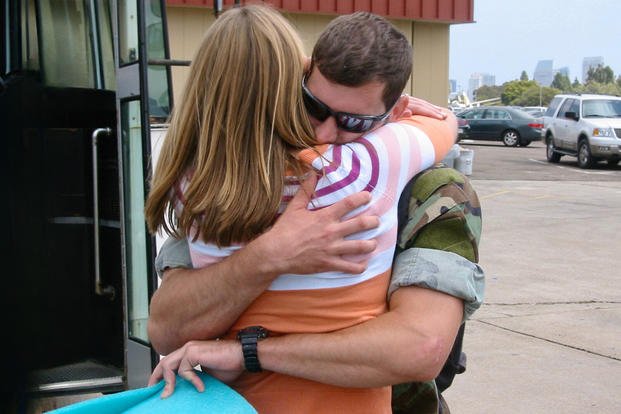The United States government has designated Friday, May 10, as Military Spouse Appreciation Day, a day to recognize the contributions and sacrifices military spouses make in service to the nation. Introduced by Ronald Reagan in 1984, Military Spouse Appreciation Day was formally adopted by Congress in 1999 to celebrate military spouses. The day typically lands on the Friday before Mother's Day each year.
While Military Spouse Appreciation Day has been a fixture of the American calendar for decades, I only first learned about it in 2016 after I had been married to a naval officer for 11 years. At that point, my husband had deployed five times to Iraq, Afghanistan and elsewhere, with one deployment falling during our daughter's first year. By then, we had moved four times, and I had resigned from three jobs I loved.
I remember feeling pleasantly surprised to learn about the day for military spouses, but also perplexed. The fact that it took 11 years for me, a military spouse, to learn about Military Spouse Appreciation Day aligns with how minimally I've seen it celebrated. Aside from a presidential proclamation, an occasional email from command leadership and a few heartfelt posts on social media, very little actually happens that day.
Based on the personal sacrifices I've seen spouses make since the Sept. 11, 2001, terror attacks launched a new era of U.S. military engagement around the world, I thought by now that those not directly connected to the military would offer more visible support to military families. I would like to think Military Spouse Appreciation Day could be that opportunity. But considering less than 1 percent of the U.S. adult population serves in the U.S. armed forces, the widening divide between the military and civilian experience makes me hesitant to hope for that.
Throughout our nation's history, being married to the military has never been easy. In 1951 my grandmother, who emigrated from Europe during World War II, was newly married to an enlisted sailor who deployed on the USS Midway. The letters my grandfather wrote reveal she was left to fend for herself at a new duty station, finding a job and caring for home and family matters as both the Korean and Cold Wars loomed. My grandmother supported my grandfather throughout their separation. She kept track of their finances and repaired the car. She reported news of a family death and offered heartfelt encouragement, despite the challenges she faced back home alone.
"Don't you think you aren't doing the Navy any good," she wrote in one letter. "You are giving it your time, your energies, your talents, and several years of your life. The Navy is extremely fortunate to have you in its midst."
Generations later, that sentiment is still true. The services are, indeed, fortunate to have the time and talents of our hard-working service members. What's also still true is that many of the struggles my grandmother faced more than 70 years ago are some of the same struggles my military spouse friends and I have experienced in recent years. Nothing in today's headlines suggests the role of military spouse is getting easier.
The frequent relocations are especially disruptive to families and spouses' careers. Today, these inconvenient moves come alongside record-low housing supply and sky-high rental costs. And while remote work and military spouse hiring initiatives have been a game-changer for some, there's a long way to go to improve the dismal 21% military spouse unemployment rate and even higher underemployment among military spouses.
Beyond statistics are hidden sacrifices that are difficult to quantify. Military spouses orchestrate the ongoing logistics of cross country and overseas moves, sometimes with little notice. They parent alone for months at a time, often far away from extended family. They quit beloved jobs and shelve their career aspirations when orders declare it's time to relocate. Some military spouses give birth without their partner present, solo-caring for a newborn for months until homecoming.
Adding to the heavy load, spouses watch partners and friends return from war and trainings with permanent injuries and psychological scars. And some never return. When service members make the ultimate sacrifice, a network of spouses provide crucial support to Gold Star families, delivering meals and volunteering to help however they can during those first heartbreaking months and beyond.
The sacrifices endured by military spouses, both professionally and psychologically, are deep and real and lasting. Whether you know us or not, your help can make a difference not only on Military Spouse Appreciation Day, but all year round.
Reflecting back on the long months of solo-parenting that dragged on while my husband served on combat tours, I am so grateful for the hands-on help we received from neighbors, extended family and even strangers. A nonprofit foundation generously provided babysitting hours. A woman I met during a walk on the beach came over just to fold laundry.
I hope all families can receive that kind of support. And as my husband's active-duty service approaches its end, I feel compelled to share this greater wish for military spouses serving in the years to come.
A wish for community groups and local ministries to offer child care for military families during deployments.
A wish for broad support and funding of organizations that directly help military spouses, such as the National Military Family Association, the Station Foundation, Blue Star Families and the USO.
A wish for military spouses to get a text from a hometown friend that says, "I saw the news about the Middle East. Hope your family is doing OK."
Despite constantly changing global conflicts, military spouses tend to make it look like we've got everything handled. And by and large, we do. But every so often, it's helpful to know our family's service matters to someone outside our military community. Perhaps Military Spouse Appreciation Day could be an opportunity to share support and encouragement, whether or not you personally know a military spouse.
Peyton Roberts is a Navy spouse of 18 years, mother of two, and a fiction and nonfiction writer. Her newest book is "My Dearest Bea: Love Letters from the USS Midway".
Keep Up with the Ins and Outs of Military Life
For the latest military news and tips on military family benefits and more, subscribe to Military.com and have the information you need delivered directly to your inbox.














